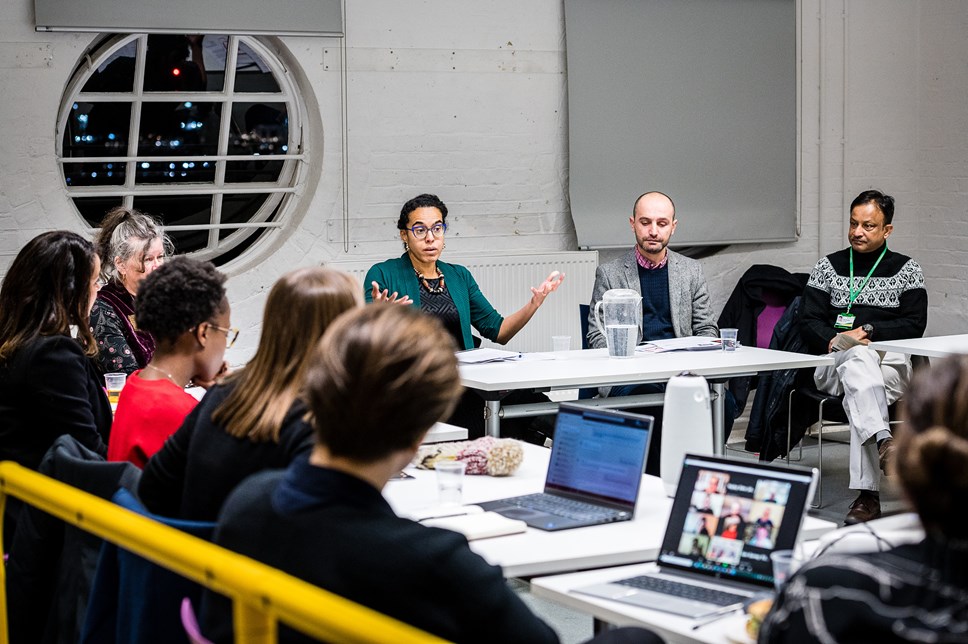
Force to be reckoned with – Let's Talk Islington team to tackle inequality
As part of its drive to make the borough a more equal place, Islington Council has formed a Task Force of business, academic and local leaders to examine the real issues affecting local people.
The #LetsTalkIslington Inequality Task Force Members - including Miatta Fahnbulleh, of the New Economics Foundation and Professor Donna Hall, formerly of Wigan Council - met up for the first time to discuss how, together with residents, they will tackle inequality.
The council is aware that the pandemic, a decade of austerity and Brexit have all exposed the deep inequalities that persist in Islington; 1 in 3 children in our borough are currently living in poverty and on average in Islington, 70 per cent of people’s earnings are spent on rent.
Launched two weeks ago in Caledonian Park, the #LetsTalkIslington programme involves a series of public engagement events and targeted community activities, as well as a public survey and call for evidence between now and March 2022.
The council will be asking everyone who lives, works or studies in the borough: “What would make Islington a better place to live for you, and how can we create a more equal future for everyone?”
The recommendations of the Inequality Task Force, combined with the findings from the community engagement, will inform a refreshed strategic plan for the council which will include actions to tackle inequality in the borough. Elements of the plan will be tested in summer 2022, during a series of local events.
The Inequality Task Force, chaired by Executive Member for Health and Social Care, Cllr Nurullah Turan, will aim to meet for three separate in-depth workshops over the next 5 months.
“We can no longer rely on old and out-dated ways of working to solve deep-rooted problems,” Council Leader Cllr Kaya Comer-Schwartz told the meeting, as she welcomed the Task Force, some virtually, at the Lift youth hub.
“Years of austerity, Covid, Brexit, the Climate Emergency and Black Lives Matter movements have taught us that we need to do things differently – and work more closely than ever with our partners and community.
“The way forward must be more collaborative so that we are co-producing solutions that tackle inequality for now and future generations.
“We must listen carefully to what our residents have to say to us and really get underneath the lived experiences of how inequality holds people back – especially those who we don’t usually hear from.
“The purpose of the task force is to support the council to embrace new ways of working and help us to respond to the priorities that emerge from communities through our engagement programme.”
Inequality Task Force Member Sam Gurney, Trades Union Congress Regional Secretary for London, East & South East, pointed towards the Fairness Commission, which recommended that Islington work towards being a living wage borough.
While the council has made great strides – becoming an accredited living wage council in 2012 and recently becoming north London’s first accredited Living Wage Place – we are now facing more complex challenges such as the rise of the ‘gig economy’ and zero hours contracts, which mean we have to work together to find new solutions.
He said: “This work needs to be about building on past successes and evolving the ways we work together.”
Dr Ben Smith, Inequality Task Force Member and local GP at Killick Street Health Centre, in Barnsbury, added: “We need to leave our egos behind with this work – the council isn’t always best placed to decide the impact needed on people’s lives, so this is about stepping back and supporting communities to take the lead.”
Notes to editors
Delegates discussed at their first meeting on Thursday, 2 December:
- How the council and the Inequality Task Force can work with communities to design solutions to the issues raised in the engagement
- Loneliness, child poverty, mental health and inflated rents were identified as areas in which a great deal of engagement was required
- The need to engage with seldom-heard groups to gain insights into deprivation and poverty was discussed
- There was clear agreement that there must be a shared vision of what success looks like
To have your say on How can we make Islington more equal?
For engagement activities happening in December see here.
For more information about the programme in general read here
To make enquiries and get involved in spreading the message email: LetsTalkIslington@islington.gov.uk
To see the full list of Inequality Task Force Members visit here
Contact information
If you are a member of the public with a general question about the council please view the contact information on our website or call 020 7527 2000.
